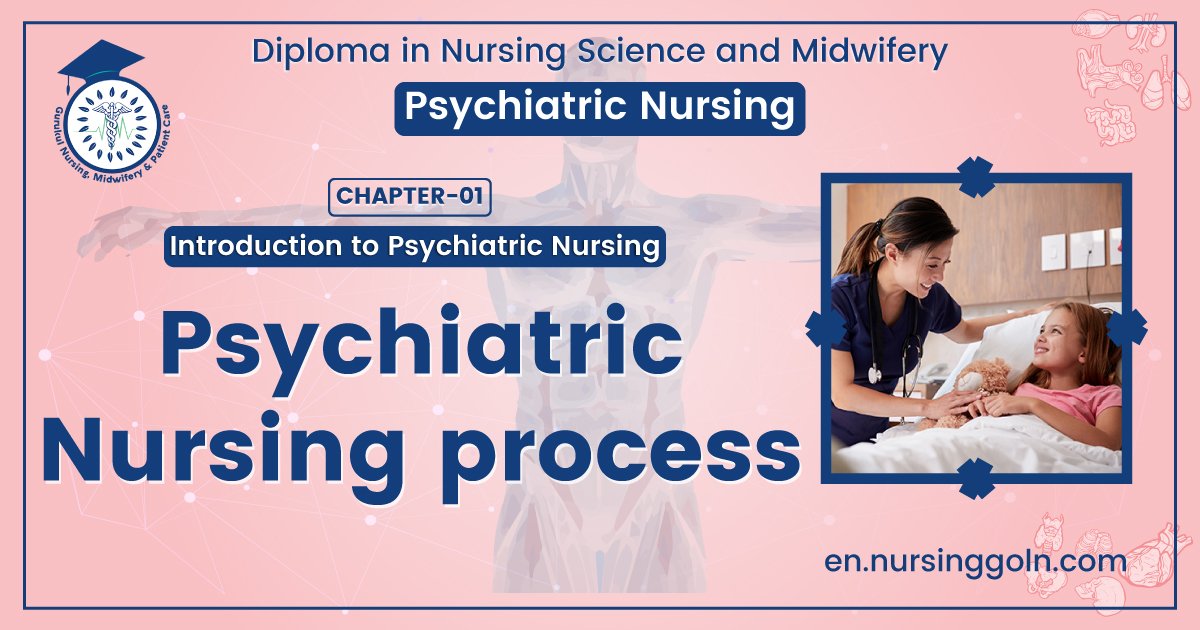Psychiatric nursing process – This book covers the entire syllabus of “Psychiatric Nursing” prescribed by the Universities of Bangladesh- for Basic and diploma nursing students. We tried to accommodate the latest information and topics. This book is an examination-friendly setup according to the teachers’ lectures and examination questions.
At the end of the book previous university questions are given. We hope in touch with the book students’ knowledge will be upgraded and flourish. The unique way of presentation may make your reading of the book a pleasurable experience.

Psychiatric nursing process
Nursing process:
‘It is an organized, systematic provision of rendering individualized nursing care to meet the holistic needs of the mental patient by utilizing problem solving approach in the field of nursing’.
(Ref: KP Neeraja/l/Vol-2/363)
Steps of nursing process:
The steps of nursing process
1. Nursing Assessment:
To identify the clients’ problems and felt needs, the following methods will be used (collection of data) –
The collection of data can be obtained through different sources:
➤ Primary source-collecting the data directly from the patient and his relatives or friends (significant personalities)
➤ Secondary source-collecting information through records and reports. For example, process recording, nurse’s report etc.
2. Planning the Care:
In planning nursing care of the client, nurses will involve the client, his family and members of health team. Basic components of written nursing care plan-
➤ Assessment of clients’ needs
✓ Objective data
✓ Subjective data
➤ Stating nursing diagnosis
➤ Goal/objectives
➤ Nursing activities/nursing actions
➤ The outcome criteria/expected behavioural outcome of the client.

3. Implementation of Nursing Care:
When planning is put into action, i.e. providing comprehensive nursing care to the client to meet holistic needs of client. Nursing actions are client oriented and goal directed. based on scientific and interdisciplinary principles nurse has to possess professional skills in implementing nursing activities.
Nursing actions are of 2 types:
➤ Dependent nursing actions: Actions derived from the doctor’s prescriptions, c. administration of medications
➤ Independent nursing actions: Based on nursing diagnosis and plan of care. c. motivating the client to catharsizes or ventilate the internal conflicts.
4. Evaluation:
It is the final step in nursing process. It is ongoing and continuous. It helps us, the outcome of nursing activity, whether the client relieved from problem or still existing. Nurse will be able to assess (visualize) how far the nursing activities are helpful to relieve clients’problems. Is it appropriate and able to plan or modify the strategy to achieve the targets or desired goals. Evaluation is the feedback mechanism for judging the quality of nursing care.
(Ref: KP Neeraja/1/Vol-2/364-366)
In short:
| Nursing steps | Function of the step |
| Assessment | Establishing a data base about a patient |
| Analysis | Identifying the patient’s health-care needs and selecting goals of care. |
| Planning | Designing a strategy to achieve the goals established for the patient. |
| Implementing | Initiating and completing actions necessary to accomplish the defined goals. |
| Evaluating | Determining the extent to which the goals have been achieved. |
[Ref: S Nambi/2/101]
Advantages of nursing process
1. Assesses relevant/needed data in a scientific and systematic manner
2. Classifies and analyzes the data
3. Delegates the nursing care aspects to various health team members
4. Enhances decision making process
5. Ensures standards of nursing care
6. Attains specified objectives through nursing action
7. Provides continuity of care and follow up care
[Ref: KP Neeraja/1/Vol-2/366/]

Qualities that form the process of psychiatric nursing:
1. Recognition and understanding of the elements of the relationship
2. Appropriate thinking and problem solving
3. Theoretical framework and interactional structure
4. Therapeutic use of self.
[Ref: S Nambi/2/09/]
